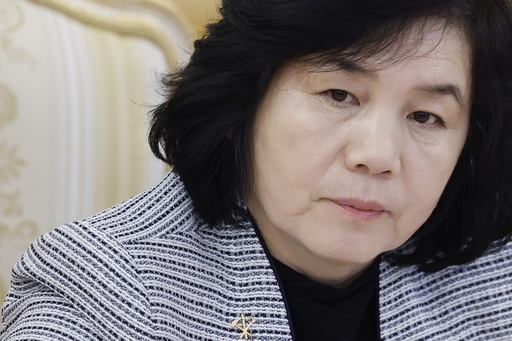
MOSCOW — North Korea’s leading diplomat is scheduled to engage in discussions in Moscow on Wednesday, following reports indicating that the nation has dispatched a significant contingent of troops to Russia to aid in its ongoing conflict in Ukraine.
The arrival of Foreign Minister Choe Son Hui comes on the heels of a Pentagon announcement revealing that North Korea has sent around 10,000 soldiers to Russia, expected to be deployed within “the next several weeks.” Major General Pat Ryder, the Pentagon press secretary, stated on Tuesday that a “relatively small number” of North Korean military personnel are already stationed in the Kursk region, where Russian forces have been facing challenges against Ukrainian advances. He noted that it remains unclear how Russia and North Korea intend to utilize these troops.
Western leaders have characterized the movement of North Korean forces as a significant escalation, likely to alter diplomatic dynamics within the Indo-Pacific region. Although neither Moscow nor Pyongyang has disclosed the exact agenda for Choe’s discussions, South Korea’s intelligence agency shared in a confidential session with parliament that Choe may participate in high-level negotiations regarding the possible dispatch of more troops to Russia, alongside discussions about what benefits North Korea might receive in return.
Concerns have been raised by South Korean and Western officials about the potential for Russia to exchange military technology that could advance North Korea’s nuclear arsenal and missile capabilities. Both Moscow and Pyongyang have responded ambiguously to assertions regarding the North Korean troop deployment, insisting that their military collaboration adheres to international law while refraining from explicitly confirming the presence of North Korean forces in Russia.
The United States and its allies have also accused North Korea of supplying Russia with millions of artillery shells and other military supplies to support its operations in Ukraine. Additionally, Russia and China have obstructed U.S.-led initiatives at the Security Council aimed at strengthening sanctions against North Korea in light of its recent missile developments, which have escalated following Russia’s invasion of Ukraine in 2022. Russia also vetoed a U.N. resolution in March that sought to extend the mandate of monitors, thereby diminishing U.N. oversight of existing sanctions against North Korea.
In a telephone conversation on Tuesday with Ukrainian President Volodymyr Zelenskyy, South Korean President Yoon Suk Yeol expressed concerns that increasing military collaboration between North Korea and Russia could represent a “major security threat” to South Korea, particularly if North Korea were to gain access to Russian military technology and its troops acquired combat experience.
Last week, President Yoon brought up the possibility of sending weapons to Ukraine, mentioning that South Korea is preparing incremental countermeasures that could be implemented based on the level of military coordination between Pyongyang and Moscow. As an expanding arms exporter, South Korea has extended humanitarian assistance and non-lethal support to Ukraine while participating in U.S.-led economic sanctions against Russia. However, it has so far refrained from fulfilling requests from Kyiv and NATO to provide direct military support, adhering to its long-standing policy of not supplying arms to nations currently involved in armed conflict.
